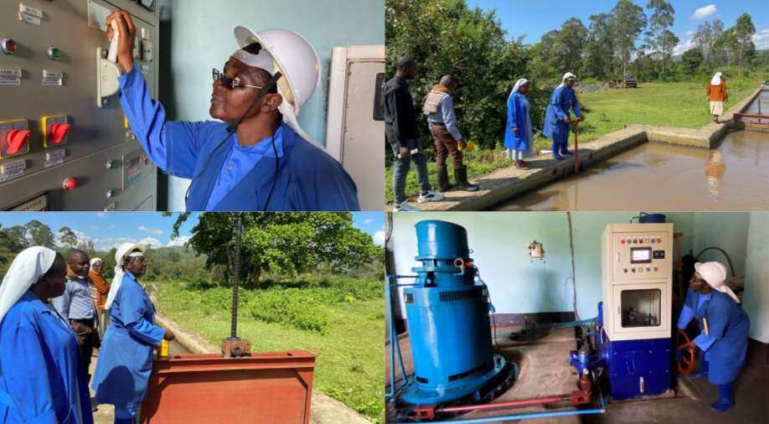
Audio By Carbonatix
Sister Alphonsine Ciza spends most of her day in gumboots, white veil tucked under a builder's hat, manning the micro hydroelectric plant she built to overcome daily electricity cuts in her town of Miti in eastern Democratic Republic of Congo.
She works around the clock with a team of nuns and engineers, greasing machinery and checking the dials of a generator that is fed from a nearby reservoir.
The mini plant lights up a convent, church, two schools and a clinic free of charge.
Without the plant, residents would only have electricity two or three days a week for a few hours.
"This is the alternator that produces the current and here we have the cabinet that sends the current to the population. It's here that we make adjustments, it's called the electrical cabinet," said Ciza, 55, a portable voltage meter slung around her neck in the town of 300,000 inhabitants near the border with Rwanda.
Blackouts are a daily disruption in the Congo, a vast central African country of around 90 million people that sources most of its electricity from a run-down and mismanaged hydropower system.
The government has worked with foreign partners in an effort to increase the capacity of the mineral-rich nation's ailing grid. Critics say the new projects focus too much on powering mines and exporting electricity to neighbouring countries.
Despite millions of dollars in donor funding, only around 20 per cent of the population has access to electricity, according to the World Bank.
Fed up with relying on candlelight and costly fuel-powered generators, Ciza started raising money in 2015 to build the hydropower plant.
She picked up skills as a young nun, repairing electrical faults around the convent, which convinced superiors to send her to study mechanical engineering.
It took Ciza's convent three years to gather the required $297,000 (€284,897) and build the plant, which generates between 0.05 and 0.1 MW.
Thanks to Ciza's efforts, students at Miti's Maendeleo secondary school can now learn computer skills from screens rather than from books.
"It was rare to find power during the day. We had to use fuel for the generator, but buying fuel was very expensive. It was no longer possible at some point, so we were forced to stop and only teach theory for the computer science course," said headmistress Mweze Nsimire Gilberte.
Latest Stories
-
Tragic End: Man who died after hospitals refused him treatment, buried
4 minutes -
Opanin Joseph Kofi Nti
2 hours -
Flights cancelled and new travel warnings issued after Iran strikes
3 hours -
Helicopter crash: Children’s support fund surpasses GH¢10.15m
3 hours -
MobileMoney Ltd breaks silence on viral TikTok fraud claim, urges public to dial 419
4 hours -
Blind refugee found dead in New York after being released by immigration authorities
5 hours -
Stanbic Bank Ghana leads $205m financing for Engineers & Planners
5 hours -
MobileMoney Ltd responds to viral TikTok video by Healwithdiana, advises customers to report fraud on 419
5 hours -
Mobile Money Ltd’s Paapa Osei recognised in Legal 500 GC Powerlist: Ghana 2026
5 hours -
Flights in and out of Middle East cancelled and diverted after Iran strikes
6 hours -
Dr Maxwell Boakye to build 50-bed children’s ward at Samartex Hospital in honour of late mother
6 hours -
One killed and 11 injured at Dubai and Abu Dhabi airports as Iran strikes region
6 hours -
Former MCE, 8 others remain in custody over alleged land fraud in Kumasi
6 hours -
Black Queens players stranded in UAE over Israel-Iran conflict
7 hours -
James Owusu declares bid for NPP–USA chairman, pledges renewal and unity
7 hours

